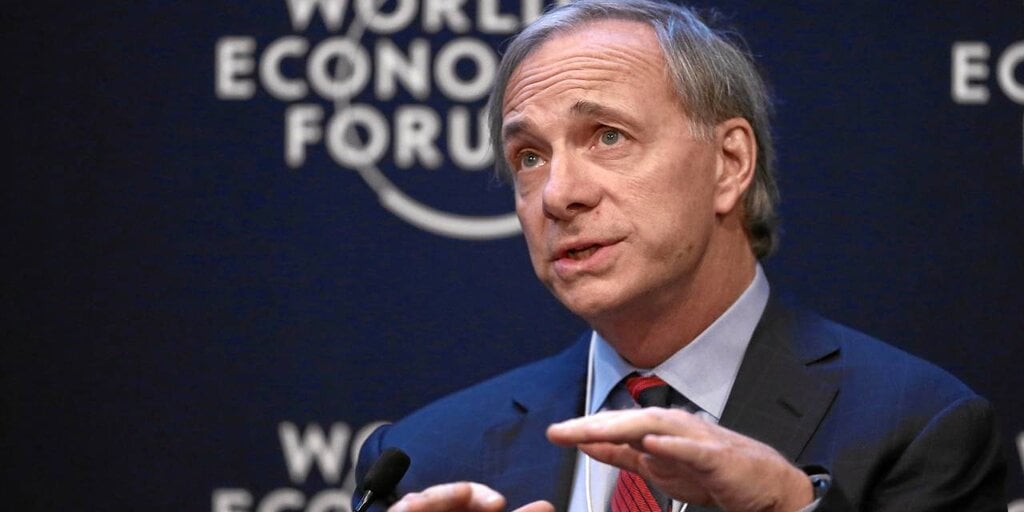Billionaire Investor Warns of Global Economic Chaos
Billionaire investor Ray Dalio suggests that the recent market meltdown triggered by President Trump’s sweeping tariff policy reveals more than just short-term volatility and a flight to safety. Dalio, who founded Bridgewater, the world’s largest hedge fund by discretionary assets under management, wrote that the world is witnessing a "once-in-a-lifetime" chaos that signals a "breakdown" of the global order.
Global Economic Undercurrents
Dalio argues that tariffs are merely symptoms of five underlying forces reshaping the global order: rapidly mounting debt, domestic politics, a shift in how geopolitical power is wielded, acts of nature, and the impact of technological innovations such as AI on the world economy. Debt has become "unsustainable because of the large imbalance between debtor-borrowers who owe too much debt and lender-creditors who already hold too much," Dalio argued, citing the relationship between China and the U.S.
Debt Crisis
The debt crisis is a significant concern for Dalio, as he believes that the large imbalance between debtor-borrowers and lender-creditors is unsustainable. He notes that the relationship between China and the U.S. is particularly problematic, with China owing a significant amount of debt to the U.S. This imbalance has led to a breakdown in international order, which Dalio believes is a major contributor to the current market volatility.
Global Trade and Tariffs
The recent tariff announcements by President Trump have been a significant factor in the market meltdown, but Dalio believes that they are merely symptoms of a larger issue. He argues that the tariffs are a result of the breakdown of the global order, rather than a cause of the chaos. Dalio notes that the interconnectedness of trade and capital flows means that when the unsustainable debt conditions and breakdown of international order materialize into concrete policy actions, the resulting flight to safety affects all risk assets simultaneously.
Crypto-Equity Correlations
While nascent, crypto markets have increasingly moved in lockstep with U.S. equities, showing sensitivity to macroeconomic indicators such as inflation readings and central banking decisions on rate cuts. Bitcoin’s dive below the $75,000 level, coupled with the broader crypto market’s rapid 7% contraction over the past weekend, signals a "classic breakdown of the major monetary, political, and geopolitical orders" rather than simply a reaction to trade policy. Dalio argues that the interconnectedness of trade and capital flows means that when the unsustainable debt conditions and breakdown of international order materialize into concrete policy actions, the resulting flight to safety affects all risk assets simultaneously.
Decoupling of Assets
Meanwhile, observers note that the rise in U.S. Treasury yields signals diminishing demand for government debt instruments and opens inflationary expectations. However, some divergence may be emerging. Bitcoin has gained relative strength against the "Magnificent Seven" tech stocks, suggesting that, in theory, the asset can temporarily decouple from traditional risk assets. Matthew Sigel, head of digital assets research at VanEck, previously told Decrypt that while 10-year Treasury yields surged Monday, Bitcoin’s reaction was "notably subdued," suggesting a potential decoupling from "old macro sensitivities."
Conclusion
In conclusion, Ray Dalio’s warnings of global economic chaos are a stark reminder of the interconnectedness of trade and capital flows in today’s global economy. The unsustainable debt conditions and breakdown of international order are major contributors to the current market volatility, and the interconnectedness of trade and capital flows means that all risk assets will be affected. While some divergence may be emerging, the current market environment suggests that investors should be cautious and prepared for further volatility.
FAQs
Q: What are the underlying forces reshaping the global order?
A: Dalio identifies five underlying forces: rapidly mounting debt, domestic politics, a shift in how geopolitical power is wielded, acts of nature, and the impact of technological innovations such as AI on the world economy.
Q: What is the significance of the debt crisis?
A: The debt crisis is a significant concern for Dalio, as he believes that the large imbalance between debtor-borrowers and lender-creditors is unsustainable.
Q: What is the relationship between China and the U.S. in terms of debt?
A: China owes a significant amount of debt to the U.S., which has led to a breakdown in international order.
Q: What is the significance of the tariff announcements by President Trump?
A: The tariff announcements are a symptom of the breakdown of the global order, rather than a cause of the chaos.
Q: What is the relationship between crypto markets and traditional risk assets?
A: Crypto markets have increasingly moved in lockstep with U.S. equities, showing sensitivity to macroeconomic indicators such as inflation readings and central banking decisions on rate cuts.
Q: Can Bitcoin decouple from traditional risk assets?
A: In theory, Bitcoin can temporarily decouple from traditional risk assets, but the current market environment suggests that investors should be cautious and prepared for further volatility.






![Crypto Recovery Pump Incoming!! [DUMP NEARLY OVER – ACT NOW] Crypto Recovery Pump Incoming!! [DUMP NEARLY OVER – ACT NOW]](https://i.ytimg.com/vi/MrMeVsgZJPU/maxresdefault.jpg)


